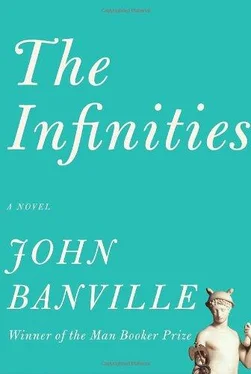On the mantelpiece there stands an old-fashioned wireless set, its green eye pulsing. From there it issues ancient music of pipes and plucked strings, tiny and far, as from another world.
Those shiny green shutters, I see them again.
And where is Benny Grace? The last anyone saw of him he had a finger to his lips, saying Ssh . Benny has gone, has stepped back into that old rackety machine to be winched up into the flies. Shortly the contraption will return for my father, who would be gone, now that he has given up his girl. See how he strides, as strong as ever was? It is always this way, when he lets them go. Debilitating business, being in love; it puts a hundred thousand years on him, the fond old fool. Well, Father, and what now?
They shall be happy, all of them. Ursula will drink no more, she and her son will go down and ceremonially empty the laurel hedge of its burden of bottles and the rats will come out and frolic like lambs. Adam and Helen will move here to Arden to live, Adam will delve and till as his originary namesake did, while Helen will wear a bonnet and carry a pail, like Marie Antoinette at the Petit Hameau. Petra will put away the razor and wound herself no more. Will Roddy come back and make amends to her? Perhaps that is a little too much to decree — we shall find someone else for her to love and be loved by in the short time left to her. Ivy Blount and Duffy we have already accounted for. What else? Adam, of course. What gift shall we give him? A hitherto unsuspected letter will turn up, a final note written by Dorothy, his dead wife, exonerating him of any blame for her sad end. Will that do?
He gazes into the twilit garden. Thick, tawny sunlight creeps along the grass, drawing spiked shadows in its wake. The trees tremble, talking of night. The birds, the clouds, the far, pale sky. This is the mortal world. It is a world where nothing is lost, where all is accounted for while yet the mystery of things is preserved; a world where they may live, however briefly, however tenuously, in the failing evening of the self, solitary and at the same time together somehow here in this place, dying as they may be and yet fixed forever in a luminous, unending instant.
Wait, who is this? Helen, of course. She rises from the armchair by the fireplace where she was sitting all unnoticed and comes forward now, smiling. Light swells in the windows, the evening’s last effulgence. The doctor expects to be spoken to but Helen seems to pass through him, somehow, a golden breath. Beyond him she stops, starts, as at a touch — it is my father, bidding her farewell, his hand on her cheek. He nods to me. I fly to Helen’s husband, where he kneels, and breathe a word into his ear. What have I to tell him? Why, that his wife is, as in our antique way we quaintly put it, with child. He hastens to his feet and turns. Helen looks back, and sees his look. She presses a hand to her womb.
“Oh!”
John Banville was born in Wexford, Ireland, in 1945. His first book, Long Lankin , was published in 1970. His other books are Nightspawn, Birchwood, Doctor Copernicus (which won the James Tait Black Memorial Prize in 1976), Kepler (which was awarded the Guardian Fiction Award in 1981), The Newton Letter (which was filmed for Channel 4), Mefisto, The Book of Evidence (which was short-listed for the 1989 Booker Prize and winner of the 1989 Guinness Peat Aviation Book Award), Ghosts, Athena, The Untouchable, Eclipse, Shroud , and The Sea (which was awarded the Man Booker Prize in 2005). He has received a literary award from the Lannan Foundation and was nominated for the Man Booker International Prize in 2007. He lives in Dublin.












